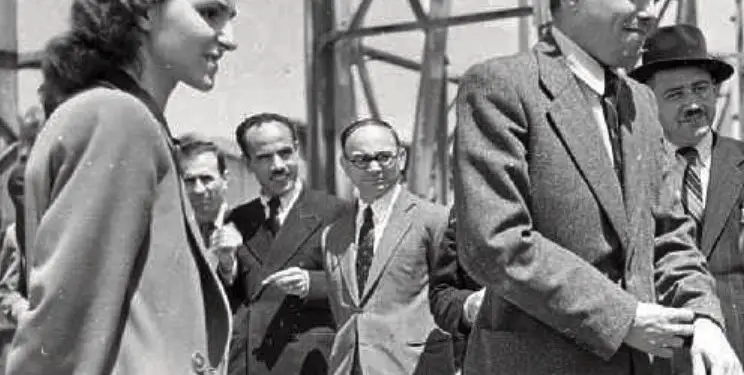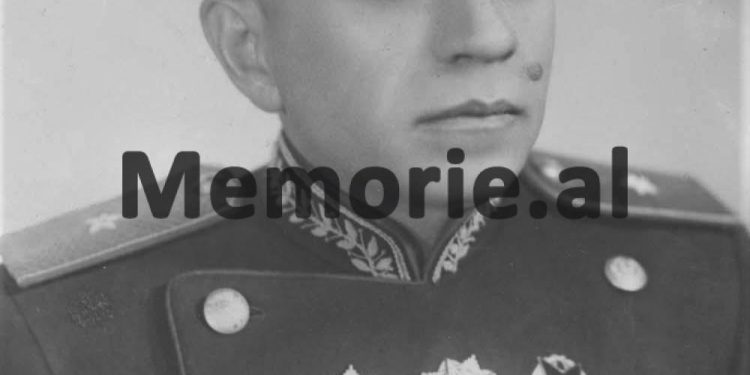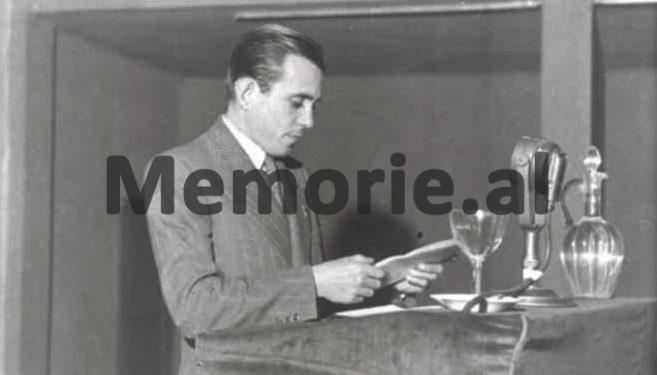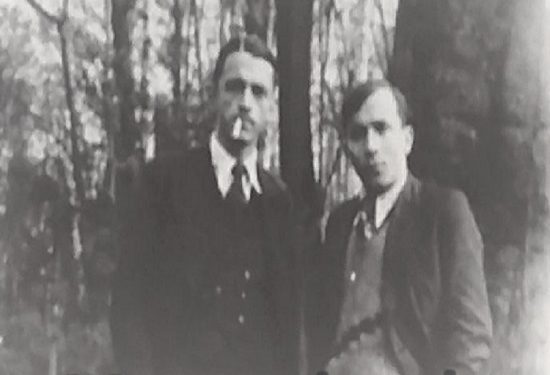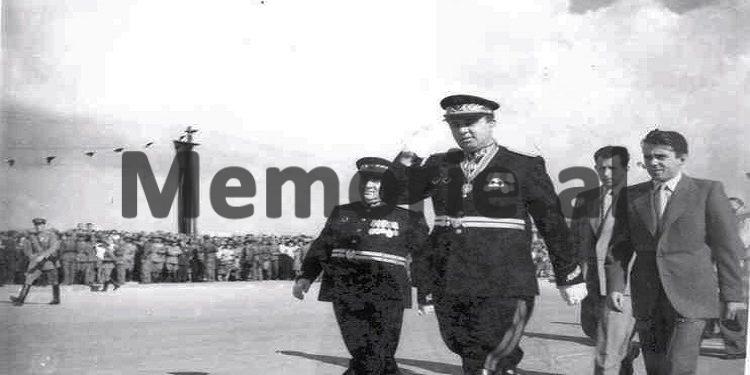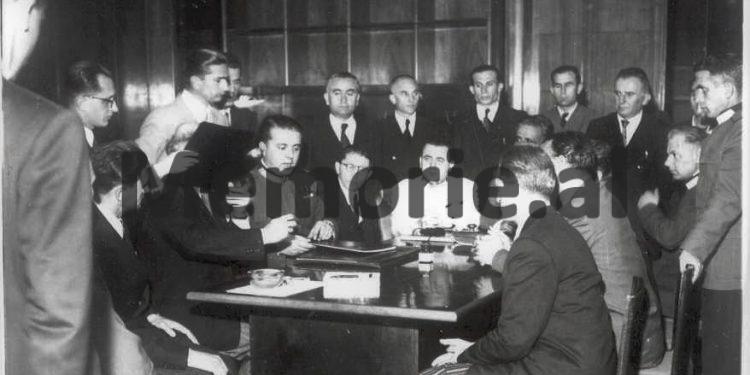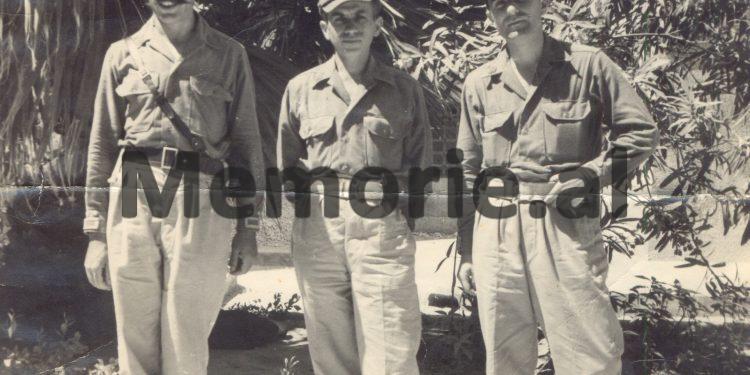Second part
Memorie.al / After the 90s, of the former senior officials of the PPSh who had been Enver Hoxha’s closest collaborators for years and who were then sentenced by him, with prison or exile, only two of them, had the courage and courage to ask for a public apology, for what they had done when they served in high positions in the leadership of PPSh and to denounce its wrong political line, as well as the many crimes of Enver Hoxha , from the creation of the Albanian Communist Party, in November 1941, (when he became its head), until the collapse of the communist regime, at the beginning of 1991.
They were; Bedri Spahiu, former member of the Political Bureau and secretary for propin, of the Central Committee of the Communist Party, deputy of the People’s Assembly and Minister of Education, until June 17, 1955, (when he was dismissed from all party functions and state, accused as “the anti-party and enemy of the people”, to later suffer prisons and exiles, until the collapse of the communist regime in the 90s) and Liri Belishova, former member of the Political Bureau and secretary of the Committee Central of the PPSh, for propaganda, until 1961, when he was dismissed from all party and state functions, accused of being a revisionist, to end up in exile, until 1991.
While Liri Belishova asked for a public apology, after 2000, (in an interview given on the ‘Opinion’ show of the journalist Bledi Fevziu on TV KLAN), Bedri Spahiu did that in 1991, with a long article that published in the newspaper “Republika” (directed by Ylli Rakipi and Lutfi Dervishi), on June 6, 1991, with the title: “Bedri Spahiu, revises Bedri Spahiu”.
Continues from last issue
From Bedri Spahiu
BEDRI SPAHIU REVISES BEDRI SPAHIU
One day I was traveling from Tirana to the Farka bridge. On the way down Farka street, I come across a group of villagers talking excitedly to each other. I tell the driver to stop and I get off and sew to the place where they were. Beside them on the ground lay a man dressed in military clothes, without ranks, and who appeared to be an old officer of the Bird army. Near the dead man’s body was the empty grave, and where the grave began, a pool of fresh blood.
“Kill as much as you want, but don’t desecrate our land and don’t terrify our children!” – an old villager told me. From his mouth, I found out that in his lands, the body of the murdered person was buried, lying on the ground. The peasant’s cow, grazing, had caught the smell of the warm blood and had started to start, as cows do in these cases. The villager had approached and dug the place where the loose soil was, from where they took out the victim’s body. In these circumstances, what could Bedri Spahiu, who was in the General Prosecutor’s Office, do in this “refugium pecatorum”? I ordered the driver to turn the car around and “flew” towards Enver Hoxha’s house.
I found Enver by the fire and excitedly told him, without greeting him: “Don’t tell me, Comrade Enver, how long will this terrorism last”?! He turned pale and began to poke the fire that was blazing in his beautiful fireplace with his long wand. I came back without even getting an answer. I left without greeting him, leaving him in the same position. Muhamet Karagjozi, one of the great pariahs of the city of Gjirokastra, grazed the sheep between the “Block”, as it is called today, I would call it the “Kremlin of Tirana”. They were the last data he had left, after continuous and prolonged requisitions.
Enver Hoxha meets this ex-wife and hugs her, like an old friend, misses her and tears come out of her eyes. “Where are you,” he says to Muhammad, the revolution separated us. As he continued to squeeze her to his chest. What should we name this sad meeting with Muhamet Karagjozi?! Well, this was Enver Hoxha, a great artist, able to skillfully engage in all scenes and appear before the public as an authentic representative of each part, as an actor of each role.
Suicide was considered and punished as a shameful act!
What was suicide back then?
It was a protest of the individual against violence and dictatorial rule. Word spread that Nako Spiru was killed. The word in my ear, reached the streets of rumors and not the official way. I asked where his body was and, in a few minutes, I was in the hospital room. I found the surgeon and a group of Germans (prisoners) with bandages, ready for blood transfusion, and Nesti Kerenxhi (Deputy Minister of the Interior), with Kristo Themelko. I saw the way to turn to Nako: “You will recover, you have to see.” He was wounded in the side of the heart, yet I believed in what I said.
But he gave me a look full of menace and contempt, and said, “No, I will not recover, nor do I want to recover,” and passed out. I broke away from this mortuary hall and returned to Enver’s house. I entered, followed by Nesti Kerenxhi and Kristo Themelko. Was it a coincidence that they broke away from Nako’s bed and followed me from them to Enver’s room?! The two friends in question know this. I found Enver talking to Koçi about various issues. I sat down in a nearby armchair and began to express and argue my doubts, that Nako Spiru could not have killed himself, but someone did. “Whoa, said Koçi Xoxe, look what the Prosecutor General brings us”?! “As much as the country needs a Prosecutor General, – I replied, – there will be variants of the detection of crimes”.
… Once at Enver Hoxha’s house, I came across a document that may have been left there on purpose, so that I could read it. All our greetings were given there to Dushan Mugosha who was leaving Albania. The greeting was simple, but full of euphoria, for the help of this old militant of the Communist Party. Nako’s greeting was of a different nature. He opened a central issue of the situation, that of Enver Hoxha’s biography and the negative role of this Albanian intellectual, in the development of LANÇ (Antifascist National Liberation War) and in the construction of our country. Nako’s greeting, for Mugosha’s work in Albania, revealed a truth of Albanian life, according to which, the dictator was not who he was believed to be and who was advertised in the Albanian press. Nako’s suicide was a protest ‘ala Nako Spiru’, against the permanence of a figure that existed in the ideality of our people.
Enver Hoxha had turned into an idol and lived thanks to the idolatry of the masses of our people. None of the leaders of that time could give the authentic figure of Hoxha with a force of truth. In 1946, when the breath of our people seemed to be dying out, I released the dedication with a memorandum, made in two copies, one of which I sent to Enver Hoxha and the other to Koçi Xoxa. “They have started, I wrote, to take away people’s houses as well. That’s how they took a villager in Theth. In Vasjar of Tepelena, a merchant took all the spoils of his shop, including 8 scented soaps. Don’t was this the goal of our reform”?!
A few days after this memo, which was ignored by Enver and Koci, I sent them another one. “It has been created in our country, an unrestrained situation in the field of justice, I wrote. It is the Party that judges and makes decisions and not the courts of the Republic. This situation must end as soon as possible and return the situation to normal”. And there I explained how I thought the way to reach this goal. One day I went to Hoxha’s house, where I also found Koçi. They were talking. When I sat down, Koçi said as a continuation of a half-left conversation, or rather, as a change of topic: “These priests are vile and dangerous, the widows who put weapons on the church altar…”! Enver answers: “They do their work, while we lack vigilance and close our eyes to them.” “No, no, said Koçi, the security agencies did not lack vigilance, on the contrary, they were the ones who discovered this ugly crime”.
From this conversation of the two, I understood that they wanted to fill my mind, not with the existence of a fact, but to convince me of the truth of a fiction. When I was serving my 25-year sentence, in the New Prison of Tirana, a friend of mine from Shkodër, a political prisoner, told me: “In 1948 in Shkodër, an anti-party group was sentenced, most of whom were Sigurimi officers who had previously participated in the arrests and punishments of people and, once upon a time, they were upset by these excesses. In the trial, average sentences were requested for them. In his claim, the Prosecutor addresses Pjerin Kčira: “Shame on you, partisan, communist, officer, you tarnished the Party”.
Pjerini stood up and said: “For the sake of that party you say, I carry a big stain and a heavy burden on my conscience. On such and such a night, with the instructions of Zoi Themel, we entered the Franciscan Church of Gjujadolli with false keys and we put weapons, documents and other compromising things behind the altars. In the morning we surrounded the place, we “discovered” the weapons, etc. We arrested many Franciscan priests, many of whom were shot.” After this statement, the trial was closed. The next session, the president raised the sentence to death. Pjerini was shot, for this deconspiracy.
I was again at Enver’s house, on one of the days when the 1st Congress took place. Mehmet Shehu arrived after me, who, before sitting down, took out a typed letter from his bag and placed it on Enver’s table. “Read it, he said, and sign it”! The letter was placed on the table in such a way that I could read it freely, of course this was on purpose. This was the order of the Ministry of the Interior, which was sent to the Security Branches in the districts, and which set rules on the use of torture. Henceforth, the order said, it is not permissible to torture the defendants, without first obtaining the authorization of the minister. Authorized! Political Secretary of the Party, Enver Hoxha!
The First Congress was a great event in the history of our people. Never, as then, did the afflicted and unfortunate rise up in the war against the atrocities of an obscurantist barbarism, such as the State Security. Hoxha accused Koçi Xoxes of everything bad that the Security Army had done. In these circumstances, when the work of the Congress was winding down, thanks to the shameful intervention of Enver, the act presented by Mehmeti, to be signed by the First Secretary of the Party, which transformed the First Congress, this euphoria of time, in much ado about nothing, it was exactly what I needed, for revenge against Enver. When I was convicted in 1958, in my trial, I presented Enver Hoxha, as the object of all the disasters that had happened to our country in the years of socialism, as the main responsible for them and I rehabilitated Koçi Xoxen.
I told Siri Charçani, the Prosecutor of the trial, that; it was true that Koçi Xoxe had made all the mistakes that were attributed to him, but he has never accepted the accusations made against him, since he made all those mistakes in agreement with Enver. Save, I said to Siri Çarçan, in the drawer of your desk my claim, which you are making today about Bedri Spahiu, as the day will not be far when these two claims, history will throw them in the trash can. Then I continued, addressing the jury: “Keep in mind that the Prosecutor is not consistent with himself. You should reject Bedri Spahi’s request to sentence him to 25 years of imprisonment and impose his death sentence If you set my sentence at 25 years of imprisonment, this means that you do not have the courage to cross the limits of a decision that you have in your pocket, which is Enver’s decision, as long as he did not sentence me to death. this means that his position has weakened since the day he shot Liri Gega and Dali Ndreu.
The prosecution witness in this trial said that I had informed her, above all, of the secrets of the Party. I intervened, asking this witness: “Did I talk to the witness about the fact that in the 8th Plenum, Enver Hoxha, proposed that Marshal Tito be elected as the First Secretary of the Central Committee of the Albanian Communist Party, and that Koçi Xoxe, jumped up and said, addressing the plenum: “What does Enveri propose to us? We don’t need a First Secretary.
No one has proposed the replacement of Enver, so he is and remains the First Secretary of the Party. Regarding the proposal to make Marshal Tito secretary of our Party, I say that this proposal has no value in principle, that our Party is independent and as such, cannot choose a secretary who is not Our party”. In 1959, when Bedri Spahiu was isolated in a room of an ordinary house, on the outskirts of “Blok”, without notifying the family, Hoxha, in the presence of some members of the Political Bureau, told a Soviet that, they had arrested Bedri Spahiu, for some suspicions that fell on him.
The Soviet retorted that, this was how it was done in the Soviet Union, during Stalin’s time, even a member of the Central Committee was crazy about such things, but now it doesn’t happen like that anymore. A member of the Central Committee is no longer punished, just because he is suspected or gave a different opinion. Very, very much, it can only be excluded, in case it is proven what it is accused of. Three days later, I was released. In these circumstances, created by the intervention of the Soviet adviser, it is understood that I could not be executed, for whatever accusations were made against me.
My arrest was a so called “solitary detention”. They kept me in Kanina Castle in Vlora. It took my protest, addressed in three copies, to the head of the Vlora Department of Internal Affairs, the Presidium of the People’s Assembly and the General Prosecutor’s Office, to make Kadri Hazbi change his opinion and the shape of that prison; “siu generis”, which he had invented for me. Albania was trapped in an international disinformation center of the Soviets.
I remember that once Enver gave me information, obtained from the Soviets, to give to Thanas Nanos, to pass on. Then I was secretary of agitation-propaganda. I don’t remember the content of the information, but I remember that it was said that ATSH had to broadcast a news received from Zurich, about something that had happened somewhere. I gave this false information to Thanas Nanos and he gave it as real information of ATSH, from Zurich. Thanas Nano himself knows how much such information has been provided by ATSH, allegedly obtained from various European countries.
Albania under Enver Hoxha’s dictatorship
Albania, under the dictatorship of Enver Hoxha, was systematically transformed into a pashalak of Stalinist Moscow, into a Vojvodina and its coast, into a minefield for Tito’s provocation. I welcome this decision and I am ready to testify today, the justice of such a decision, if necessary. Enver Hoxha’s propaganda has repeatedly insisted that; Albanians have not placed the mines. This is true, because the Albanians could not put the mines, since they did not have any, but the Yugoslavs put them, with the consent of Enver Hoxha.
The issue of mines has been a state secret for us and I can be accused by the Enverists of violating this secret today. But today, I have decided to violate every state secret of the dictatorship and I feel this duty, of the freed citizen, from all the strings of the Enverian dictatorship. It is known that archives have a capital importance for the history of any nation. To waste the archives in any way is the greatest crime you can do to a nation. All the opposition faces today, like yesterday, the cult of Enver.
I think that she will always continue to face this cult, because if they are not opened and made available to all the people, the materials of the archives of the state, of the Party, and especially of the Security organs, if the conscience of the people is not formed, on the basis of the source documents and the facts of Enver’s reality, then this discrete Enver will be presented by his sympathizers, however few, as a victim of democracy, and the limit of tolerance will be crossed in damage to the issue of democracy. Enver Hoxha, this great “theorist” of the young Albanian man, this ardent partisan of people’s purification through self-criticism, this organizer of the movement of the cadre to the base, as a necessary condition, for the cadre to be enlivened, purified, inspired and bureaucratized by the healthy spirit of the working class, he was the one we have all known in practice, a great demagogue, an equally great deceiver, a falsifier of history. To continue to protect Enver, means to protect his deeds, to take over his blackness.
The role of personalities at the head of state power
Regarding the role of personalities at the head of state power, I have reached the same conclusions that Shiler has reached. Any power leader, no matter how good, will turn into a dictator if given unlimited power. We, his friends, gave it to Enver Hoxha, and here our responsibility is complete. Regarding the concept of freedom, I agree with Engels’ opinion, that freedom is the right to free information, that only free information forms the consciousness on which democracy is built.
Regarding Hoxha’s dictatorial rule, I conclude that; no personality cult of Enver Hoxha would be possible, if it did not rely on the quality of the people, to exalt him and on his own idolatry. Every nation, whether small or large, has in its nature to exalt its leaders, whether it is a civilized nation or not. Only in the field of cardinalization of power, it turns out that democracy and absolutism, the form of backward regimes, that democracy and absolutism, are regimes typical of causes, i.e., those that are destined to live long, or to be replaced quickly.
Congressmen!
Whether you are communists with tesseras handed in, whether you are communists with tesseras in your pocket, whether you are opponents of the first hours of Hoxha’s dictatorship, I salute you all, as members of the democratic movement in Albania, but I am the most furious and irresistible enemy. , with Hoxha’s dictatorship and himself. I am today, that same rebel of Labëria yesterday, who raised the people of that Labëria, in the entire area of Vlorë-Gjirokastër-Mallakastër, eternal enemy of any kind of dictatorship.
As such, I have lived my whole life and, as such, I have been persecuted by all regimes in Albania. Now that the democratic movement in Albania is in its first steps, its partisans talk about a nation and exclude from this nation the national right of the ballisticians, legalists or Zogists, to be part of this democracy, the right of these Albanians, to return to their homeland, to display their world view freely and to have the right to ask the Albanian people for power, in free elections.
Your democracy is only democracy for those who live in Albania, within the borders of the country, so it is half-hearted. The democracy that the world demands from us and the interest of the nation itself, is the full democracy of all Albanians, inside and outside the homeland. I do not believe that the CSCE will accept this truncated democracy in its bosom, and I do not believe that today’s Europe, raised to this level, deserves to sit at the round table, with partners like today’s Albania, if it does, it will be the beginning of the end of the new Europe. I know that many of the communists and the opposition will be against the claim of such a democracy, for all Albanians, for our entire nation; if we do not use the old epithets of Enver Hoxha, we will call these claims as political inopportunities.
But I, come out of the dark prisons of the Enverian regime, and I am more preoccupied to tell the truths of what is to come (as I think), than the truths of today). You can say that I may want a democracy even for my opponents of yesterday. I would say something more. Bedri Spahiu has returned to Christianity and preaches the theory of Christ, yes, yes, of Muhammad, of Buddha and of religious philosophy, of all humanity. Such is Bedri Spahiu, who suffered the atrocities of the communist dictatorship, the most brutal dictatorship, that the Albanian land has seen in its history.
Who was Bedri Spahiu?
He was born on July 13, 1908, in the neighborhood “Palorto” of the city of Gjirokastra. During his childhood, the economic situation of his family was very difficult. His father, Sinan, went to Kurbet (Turkey) in the hope of redemption. During this time, Bedri Spahiu was in primary school and by 1923, he finished primary school with excellent grades. In the economic inability to continue those classes that remained, as well as the gymnasium, on May 16, 1923, he left for Izmir, where his father was also located, hoping to continue his schooling. He graduated from the Italian elementary school in Istanbul and received his release certificate.
The period of his life with communist ideas, as he divides it himself, consists of three phases, the first of which began in September 1927 and ends in August 1931 (at the artillery school). At this stage, his activity is communist propaganda at school. The second phase begins in August 1931 (in Zog’s army), until October 1941. When the General Staff was formed, he was elected a member of this Staff. In Berat, he was elected a member of the Political Bureau and held this position until June 17, 1955. He was arrested, as soon as he passed the door of the hall where the PPSh Central Committee plenum was held, on June 17, 1955, and was isolated for five days, in One house. This came as a result of his long struggle against the politics of Enver Hoxha. After 15 days, on June 23, 1955, his family was exiled to Elbasan.
On June 1, 1957, he was arrested and isolated in Kanina Castle in Vlora, from where he was transferred to Tirana on January 4, 1958. He was sentenced to 25 years. On October 6, 1974, he was released from prison and exiled directly to Selenica. He was released from exile on May 10, 1990, the day the Internment – Deportation Commission was dissolved. Bedri Spahiu, was a Prosecutor in the Special Court, Prosecutor in the Koçi Xoxes trial and secretary of the Central Committee for Agitation-Propaganda, then Minister of Education and Culture, until the time of the Plenum of 1955. Bedri Spahiu, died on January 11, 1998 in Tirana. Memorie.al




